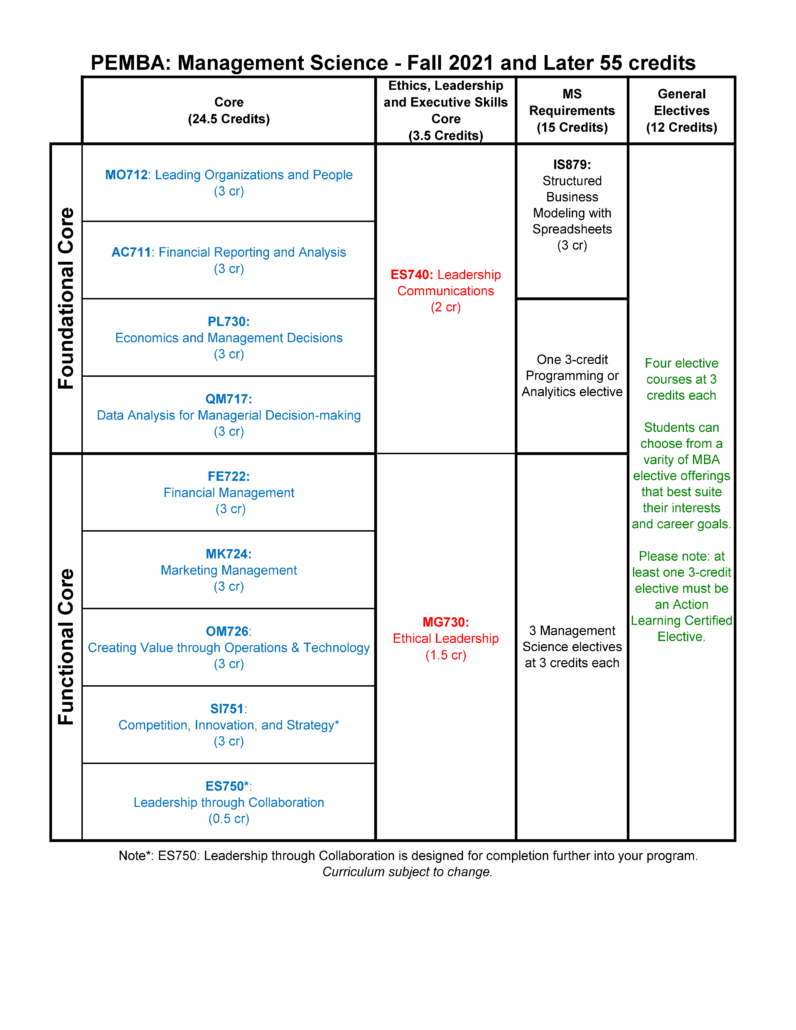PEMBA
Students complete the core curriculum in the evening and can choose to be Cohort or Flex Track. PEMBA students have a total of 27 elective credits (eight standard and one Action Learning, 3-cr electives) over the course of the program and have the option to tailor their coursework to their individual goals. Students who started Fall 2020 or later can use non-binding, undeclared Career Pathways as guides, while students who started Spring 2020 or earlier may elect to concentrate in one or more of the seven optional concentrations. It takes an average of three to three and a half years to complete the program, however, students have up to six years from the date of matriculation in the PEMBA program to complete their degree requirements.
Program Timeline Planning
You have up to 6 years to finish your MBA- there are many ways to complete your degree within your desired timeframe. Below are models to illustrate the credits needed per semester that will take you to your goal based on the timelines below- you can take longer if needed:
2 Years | 2.5 Years | 3 Years | 3.5 Years
Please note, these models do not account for course waivers.
Curriculum Check Sheets & Grids
The MBA core curriculum has been designed with a particular sequence of courses that provide an overview of management, its fundamental tools, and its key function areas. The curriculum grids listed below will help you understand degree requirements and plan your courses. Please use the appropriate checksheet as a guide for planning your courses:
- PEMBA Checksheet for Entering Fall 2021 and Later
- PEMBA Checksheet for Entering Spring 2021 and Earlier
PEMBA (Entering Fall 2021-Later)
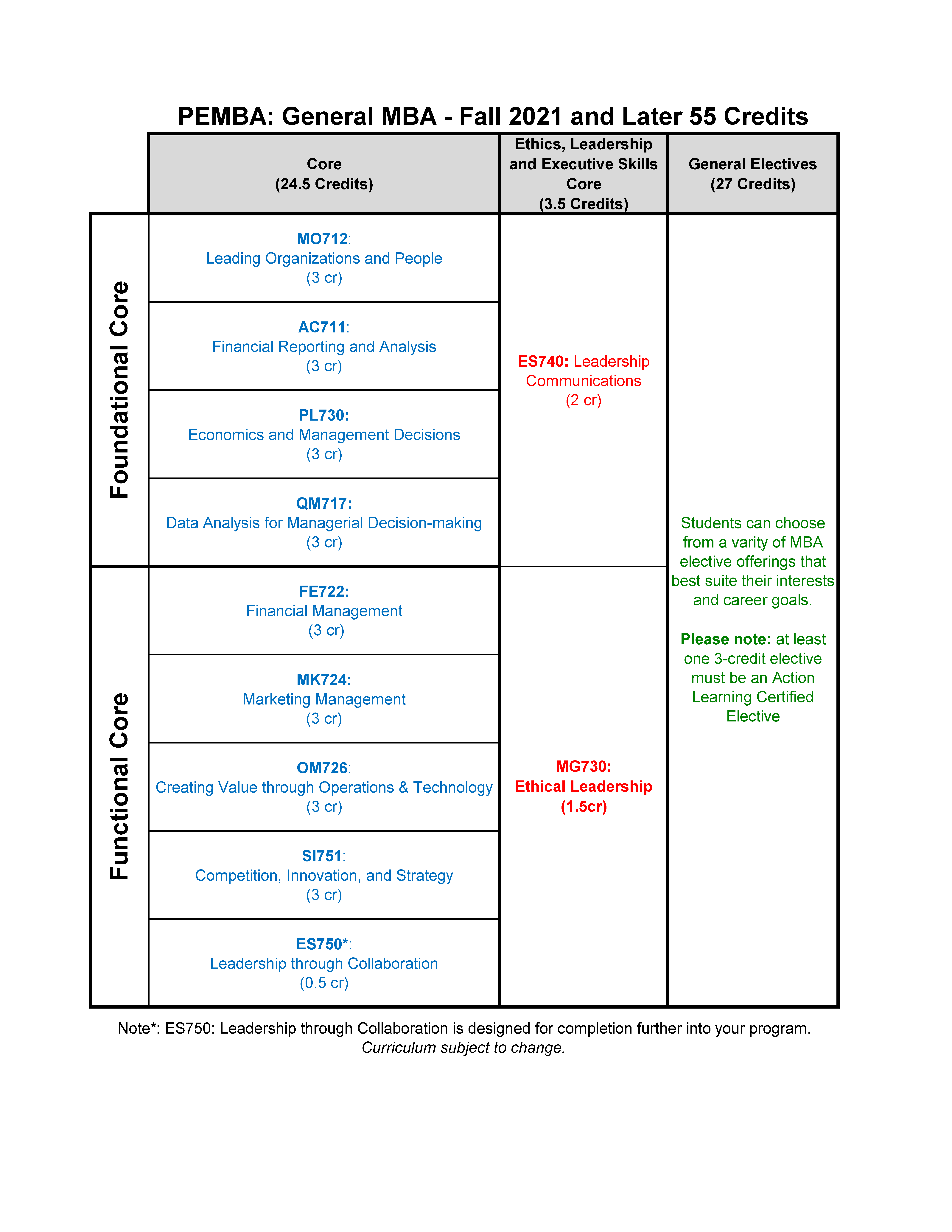
PEMBA (Entering Fall 2020-Spring 2021)
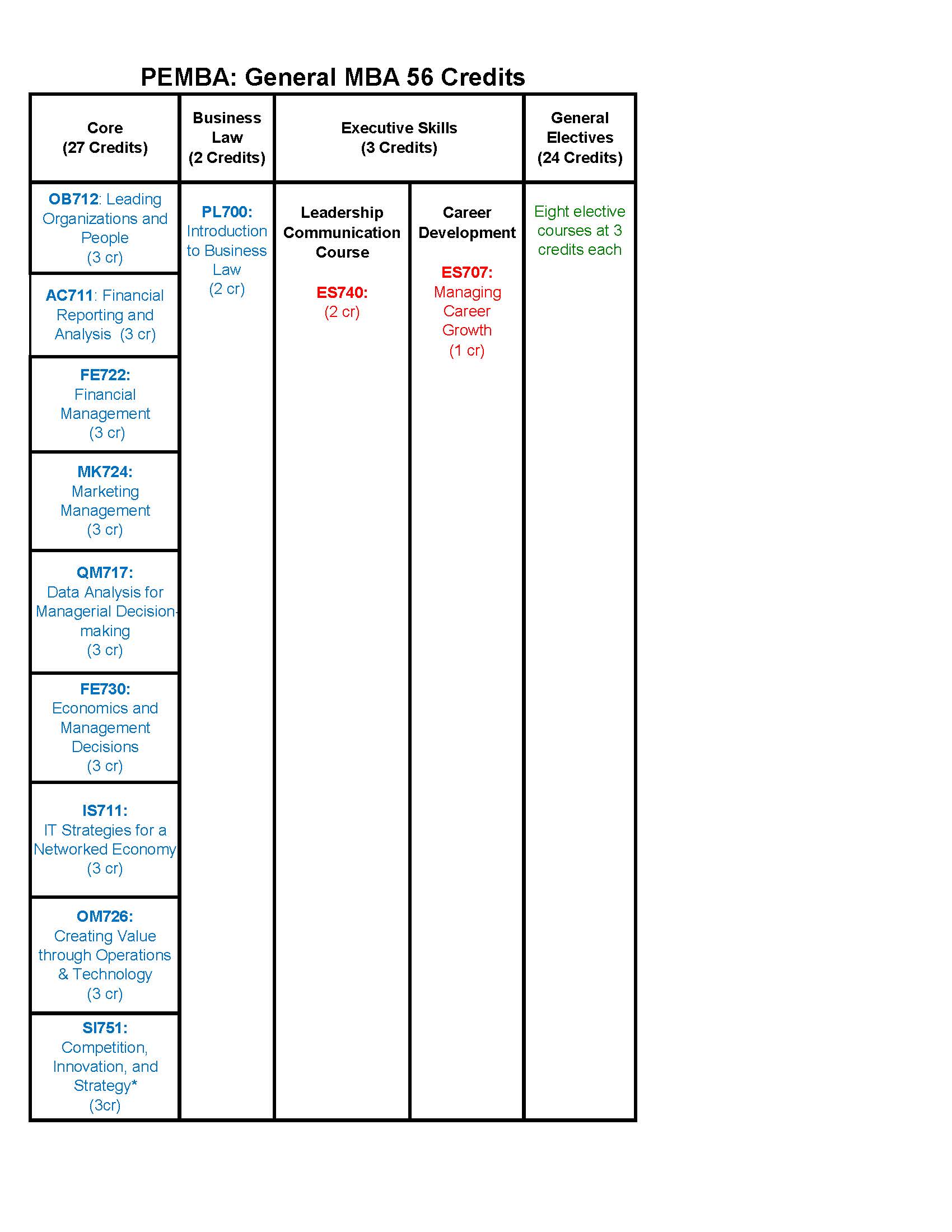
PEMBA (Entering Fall 2016-Spring 2020)

PEMBA Core Course Prerequisites
PEMBA Core courses are often taken in the order shown on the curriculum grids because the courses build upon each other. However, you are welcome to take the courses in a different order provided you have met the course prerequisites. We also here share with you additional recommended courses, where applicable.
| Course: | Curric- ulum Info: | Pre-requisite: | Semesters: |
|---|---|---|---|
| AC711 Financial Reporting and Control - 3 cr. | PEMBA Core | Fall (Evening) & Spring (Evening) | |
| ES740 Leadership Communication - 2 cr. | PEMBA Core | Fall (Evening), Spring (Evening) & Summer 1 (Evening) | |
| ES750 Leadership Through Collaboration - 0.5 cr. | PEMBA Core | Fall (Saturday) & Spring (Sat. & Sun.) | |
| FE722 Financial Management - 3 cr. | PEMBA Core | QST MO712 or MO713, QST AC710 or AC711 (previous or concurrent) | Fall (Evening), Spring (Evening) & Summer 1 (Evening) |
| IS711 IT Strategies for a Networked Economy - 3 cr. | Required for PEMBAs who entered Spring 2021 or before; Elective for FTMBAs and PEMBAs who entered Fall 2021 or after | QST MO712 or MO713, QST AC710 AC711, QST QM716 or QM717 | not offered in 2024-25 |
| MG730 Ethical Leadership in the Global Economy - 1.5 cr. | Required for FT MBA | PEMBA Core | Fall (Intensive & Saturday) & Spring (Evening & Intensive) | |
| MK724 Marketing Management - 3 cr. | PEMBA Core | QST AC710 or AC711 (previous or concurrent) | Fall (Evening), Spring (Evening) & Summer 1 (Evening) |
| MO712 Leading Organizations and People - 3 cr. | PEMBA Core | Fall (Evening) & Spring (Evening) | |
| OM726 Creating Value Through Operations and Technology - 3 cr. | PEMBA Core | QST AC710 or AC711, QST MO712 or MO713, QST QM716 or QM717 (Recommended: QST MK723 or MK724 or QST FE712 or FE722) | Fall (Evening), Spring (Evening) & Summer 2 (Evening) |
| PL730 Economics and Management Decisions - 3 cr. | PEMBA Core | QST MO712 or MO713 (QST QM716 or QM717 recommended) | Spring (Evening) & Summer 1 (Evening) |
| QM717 Data Analysis for Managerial Decision-Making - 3 cr. | PEMBA Core | QST MO712 or QST MO713 | Fall (Evening) & Summer 1 (Evening) |
| SI751 Competition, Innovation, and Strategy - 3 cr. | PEMBA Core | QST AC710 or AC711, QST MK723 or MK724, QST MO712 or MO713, QST OM725 or OM726 | Fall (Evening), Spring (Evening) & Summer 1 (Evening) |
Program Contact
Please contact your Academic Advisor in the MBA Center if you have questions about this program.
Health Sector Management MBA
The health sector is undergoing transformational growth and change, offering compelling opportunities and challenges for emerging managers and leaders. We prepare students for leadership roles throughout the health industry, including bio-technology, pharmaceuticals, medical devices, health information technology, health systems management, consulting, and public policy.
The program curriculum is designed to combine a strong education in the core functions of health sector management with the flexibility to obtain an enhanced understanding and skill set with the student’s particular areas of interest.
This curriculum provides a developed approach to:
- Build on the functional skills of the core MBA curriculum
- Provide targeted understanding of the nature of the health sector and the application of those basic skills to the sector
- Provide even greater flexibility to address specialized interests within the sector, whether health service delivery, life science products, consulting, or any other focused area
Curriculum Grids
The MBA core curriculum has been designed with a particular sequence of courses that provide an overview of management, its fundamental tools, and its key function areas. The curriculum grids listed below will help you understand degree requirements and plan your courses. Please use the appropriate checksheet as a guide for planning your courses:
- PEMBA HSM Checksheet for Entering Fall 2021 and Later
- PEMBA HSM Checksheet for Entering Fall 2020-Spring 2021
- PEMBA HSM Checksheet for Entering Fall 2019-Spring 2020
- PEMBA HSM Checksheet for Entering Fall 2016-Spring 2019
HSM PEMBA (Entering Fall 2021 and Later)
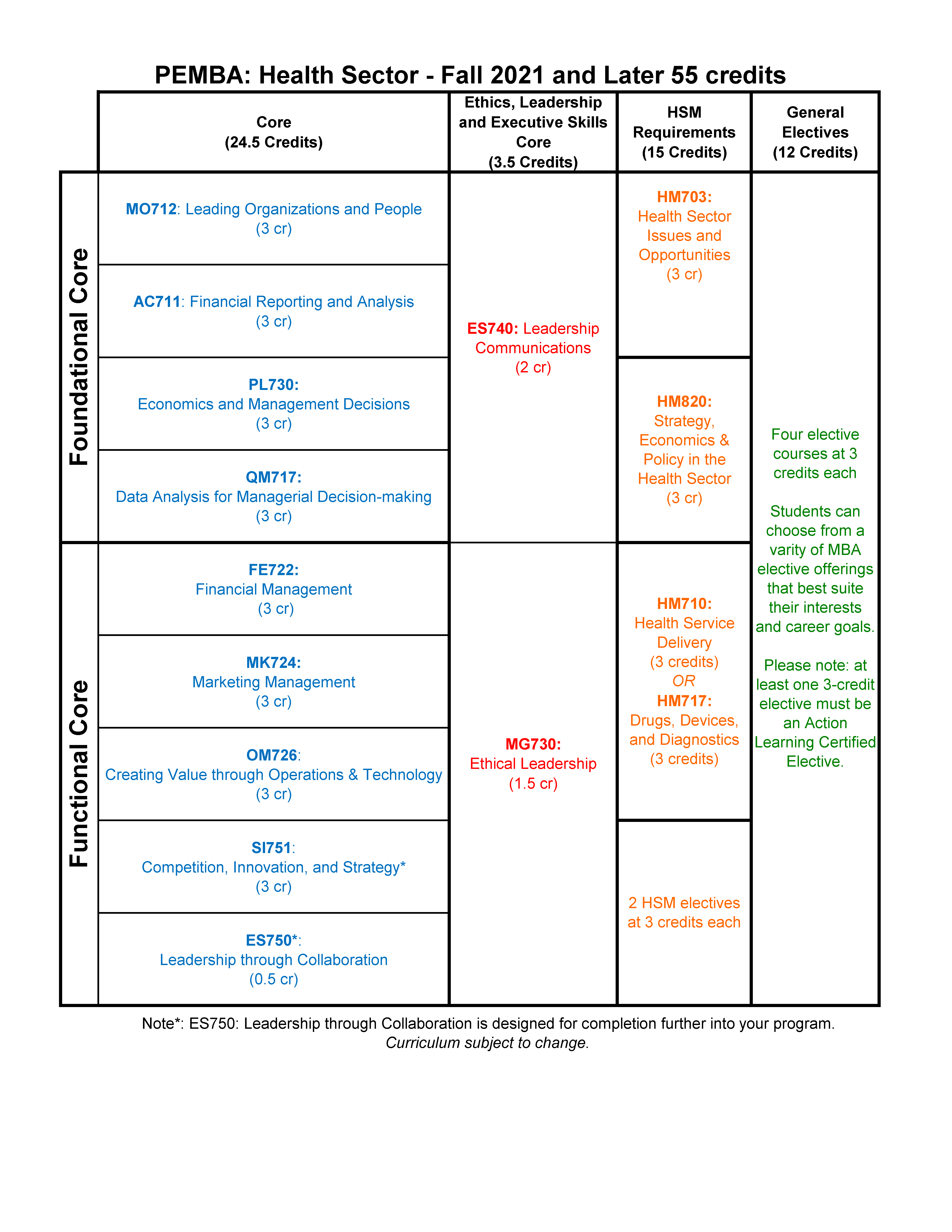
HSM PEMBA (Entering Fall 2020-Spring 2021)
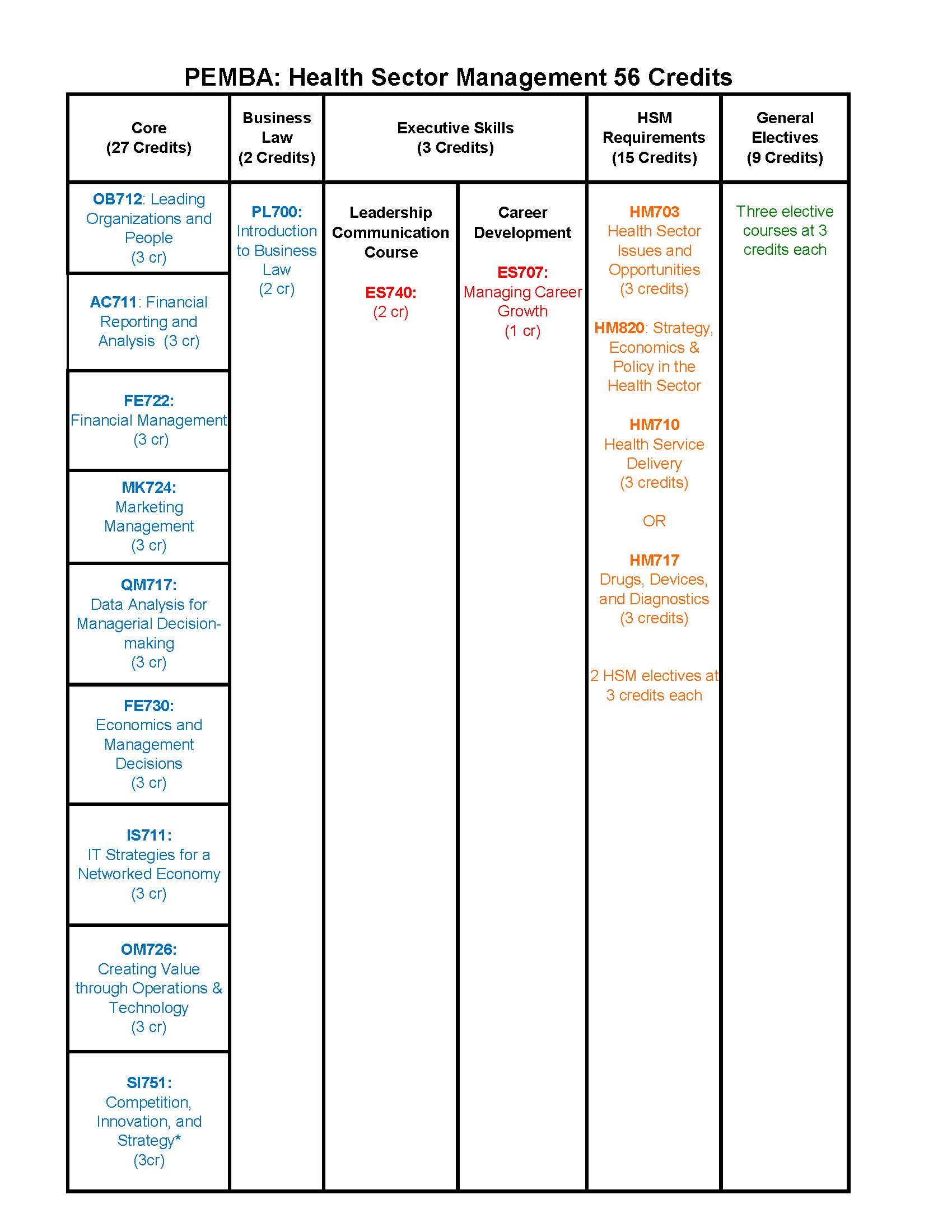
HSM PEMBA (Entering Fall 2019-Spring 2020)
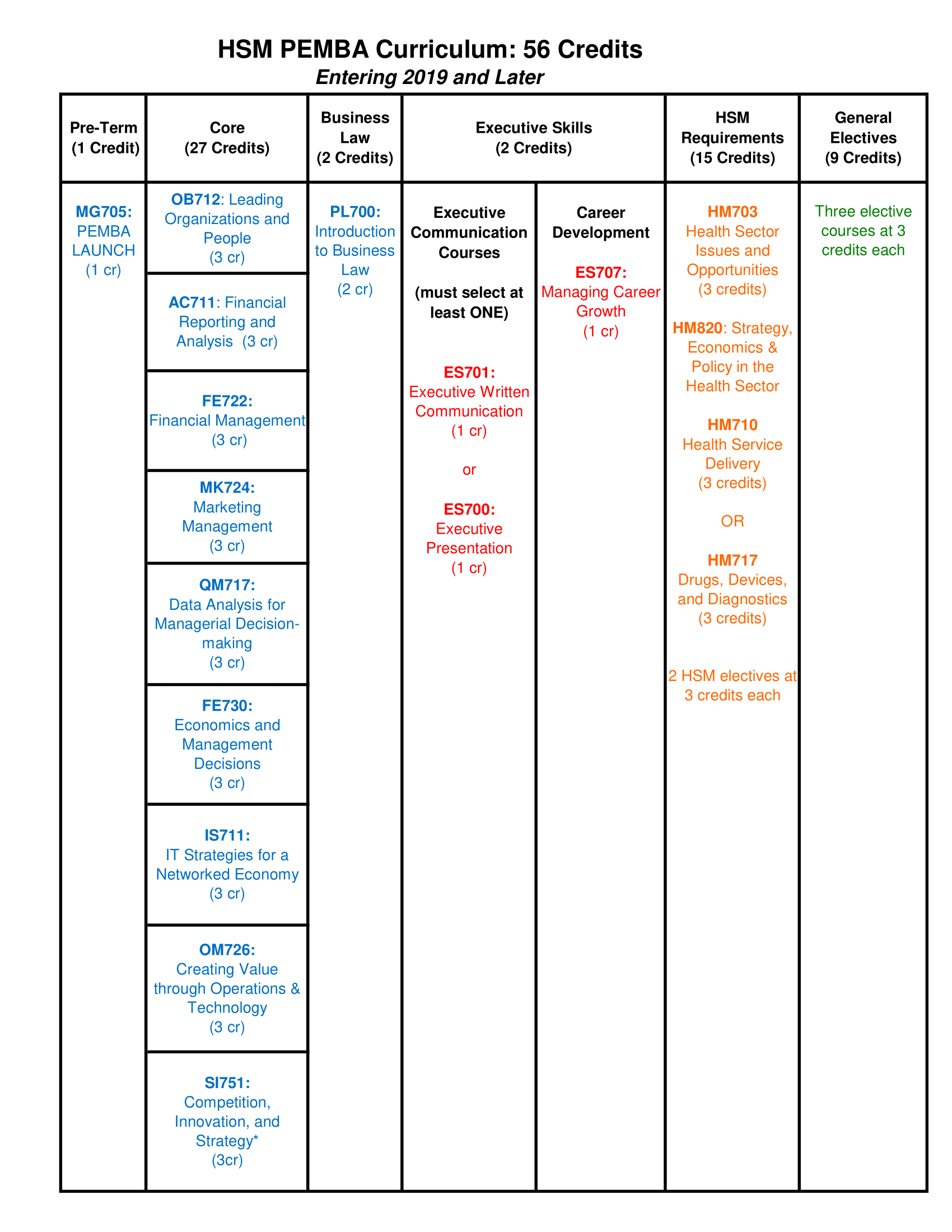
HSM PEMBA (Entering Fall 2016-Spring 2019)

Required Courses
The following courses are required:
| Course: | Curric- ulum Info: | Pre-requisite: | Semesters: |
|---|---|---|---|
| HM703 Health Sector Issues and Opportunities - 3 cr. | Fall (Evening) & Spring (Day) | ||
| HM710 Health Service Delivery: Strategies, Solutions and Execution - 3 cr. | HM710 or HM717 | QST HM703 | Fall (Evening) |
| HM717 Drugs, Devices, and Diagnostics: New Challenges, Strategies, and Execution - 3 cr. | HM710 or HM717 | QST HM703, QST FE712 or FE722, QST MK723 or MK724, QST SI750 or SI751 | Fall (Evening) |
| HM820 Strategy, Economics, and Policy in the Health Sector - 3 cr. | required for those entering Fall 2019 or later | QST PL727 or QST PL730 | Fall (Day) & Spring (Evening) |
Elective Courses (2)
These electives can create an intensive and targeted education within any subset of the health sector. Two courses selected from the following list are required:
| Course: | Curric- ulum Info: | Pre-requisite: | Semesters: |
|---|---|---|---|
| HM710 Health Service Delivery: Strategies, Solutions and Execution - 3 cr. | counts as HSM elective if not taken as an HSM required course | QST HM703 | Fall (Evening) |
| HM717 Drugs, Devices, and Diagnostics: New Challenges, Strategies, and Execution - 3 cr. | counts as HSM elective if not taken as an HSM required course | QST HM703, QST FE712 or FE722, QST MK723 or MK724, QST SI750 or SI751 | Fall (Evening) |
| HM801 Bench-to-Bedside: Translating Biomedical Innovation from the Laboratory to the Marketplace - 3 cr. | Fall (Evening) | ||
| HM817 Advances in Digital Health - 3 cr. | Fulfills Action Learning Requirement | Spring (Evening) | |
| HM820 Strategy, Economics, and Policy in the Health Sector - 3 cr. | QST PL727 or QST PL730 | Fall (Day) & Spring (Evening) | |
| HM833 Health Sector Marketing - 3 cr. | QST MK723 or MK724 | Fall (Evening) | |
| HM840 Health Sector Consulting - 3 cr. | Fulfills Action Learning Requirement | Spring (Evening) | |
| HM848 Driving Health Sector Innovation - 3 cr. | Spring (Evening) | ||
| OM840 Improving Organizational Performance with Analytics - 3 cr. | QST OM725 or OM726, QST QM716 or QM717 | Fall (Evening), Spring (Evening) & Summer 1 (Evening) | |
| SI814 Intellectual Property Strategies - 3 cr. | QST AC710 or AC711, QST FE712 or FE722, QST MK723 or MK724, QST MO712 or MO713, QST QM716 or QM717, or permission of the instructor. | Spring (Intensive) | |
| ENG BE696 Advanced Deployment of Biomedical Innovations |
* Course will count as a HSM elective if not taken as an HSM core course.
** For students starting in fall of 2019, these courses will no longer count towards HSM.
HSM Internship
For full-time students, the program requires a 400 hour Health Sector Internship that students typically complete during the summer between the first and second years of the program.
Students must confirm their internship with the MBA Center. For more information on this process please contact Eric Petersen, MBA Center HSM Liaison, at epete@bu.edu or 617.358.2788. See the following link for HSM Internship Form (Part I).
Health Sector Management Program
FCC Health Sector Career Info
Health Policy Institute Department Directory
Program Contact
Ned Rimer
Faculty Director, HSM Program
nedrimer@bu.edu
617.353.3146
Chris Bishal
HSM Liaison, MBA Center
cbishal@bu.edu
617.358.8474
Social Impact MBA
The aim of the Social Impact MBA program is to develop responsible leaders (of start-ups, established firms, and both for and non-profit organizations) who create innovative products, services, and business models that help address vital social challenges — such as climate change, food security, global health, poverty, discrimination, etc. — and enable them to grow and sustain their organizations over time.
Whether you aspire to work in sustainable finance and impact investing, responsible business, or nonprofit and public management, Questrom’s Social Impact MBA program gives you the opportunity to gain crucial business skills that allow you to create positive social change. You will learn the full array of business fundamentals like strategy, marketing, accounting, and finance, all while simultaneously specializing in topics like social entrepreneurship, sustainable energy and environment, global health, sustainable finance and impact investing, and philanthropy.
Inside and outside of the classroom, the Social Impact MBA program will connect you with best-in-class nonprofit and for-profit organizations through global field seminars, consulting projects, case competitions, guest speakers, and classroom activities. What’s more, studying in Boston puts you at the center of the action, enabling you to engage directly with academic experts and industry leaders in the social impact sector.
Curriculum Grids
The program combines a rigorous core business curriculum with elective courses in the social impact space, a required summer internship, and an engaged alumni community of graduates resulting in a full and vigorous experience for students. The checksheets and curriculum grids listed below will help you understand degree requirements and plan your courses.
- PEMBA Social Impact Checksheet Entering Fall 2021 and Later
- PEMBA Social Impact Checksheet for Entering Fall 2020-Spring 2021
- PEMBA Social Impact Checksheet for Entering Fall 2019-Spring 2020
- PEMBA Social Impact Checksheet for Entering Fall 2016-Spring 2019
Social Impact PEMBA (Entering Fall 2021 and Later)

Social Impact PEMBA (Entering Fall 2020-Spring 2021)
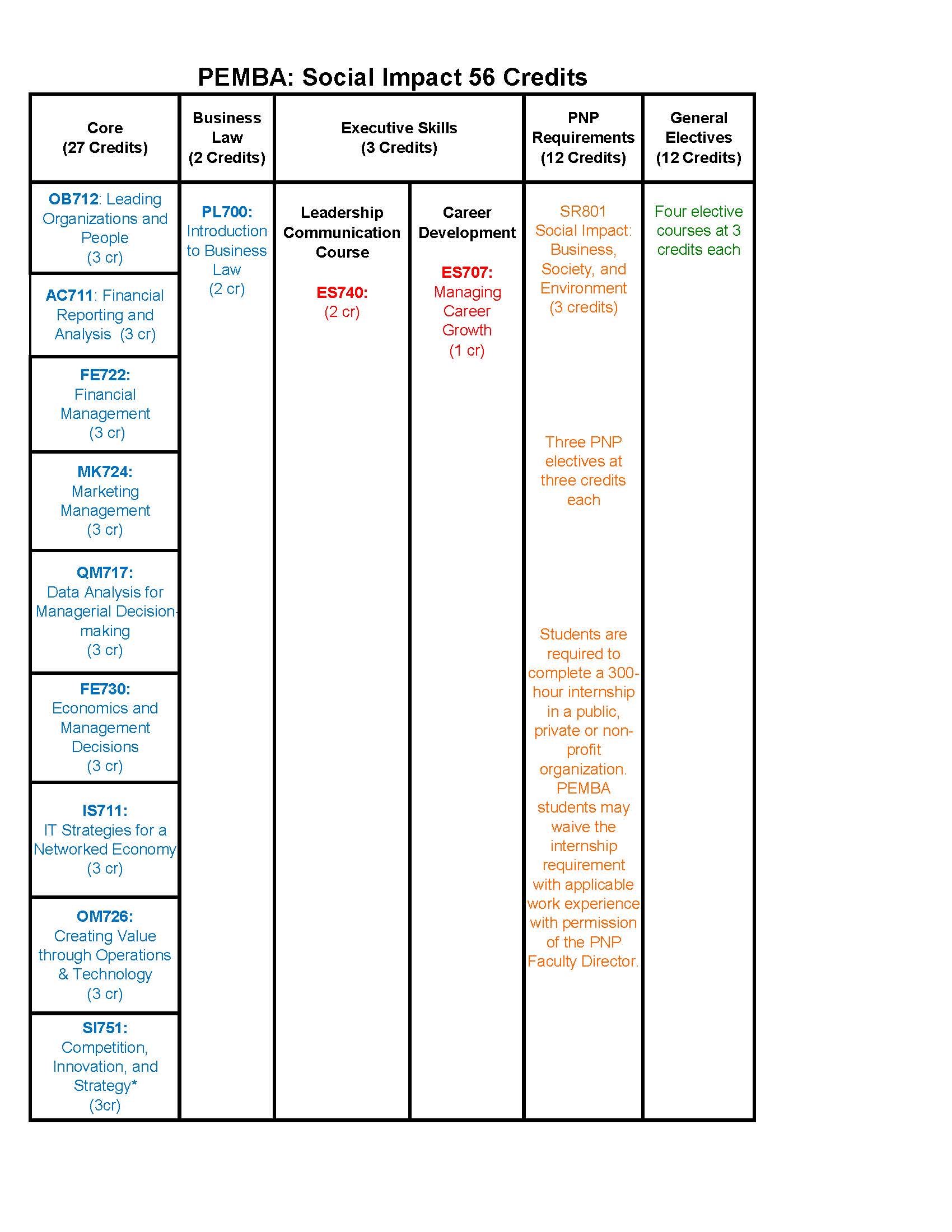
Social Impact PEMBA (Entering Fall 2019-Spring 2020)
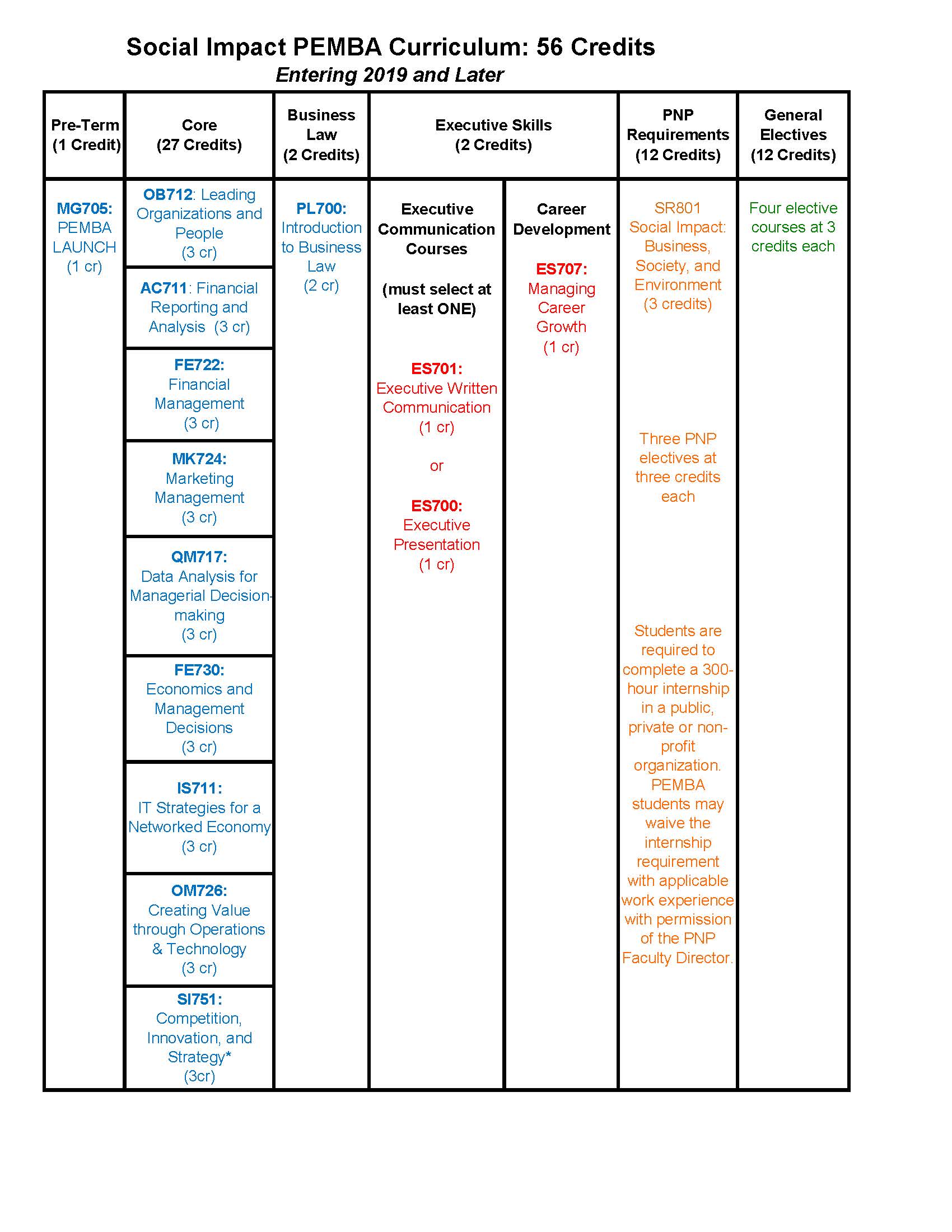
Social Impact PEMBA (Entering Fall 2016-Spring 2019)
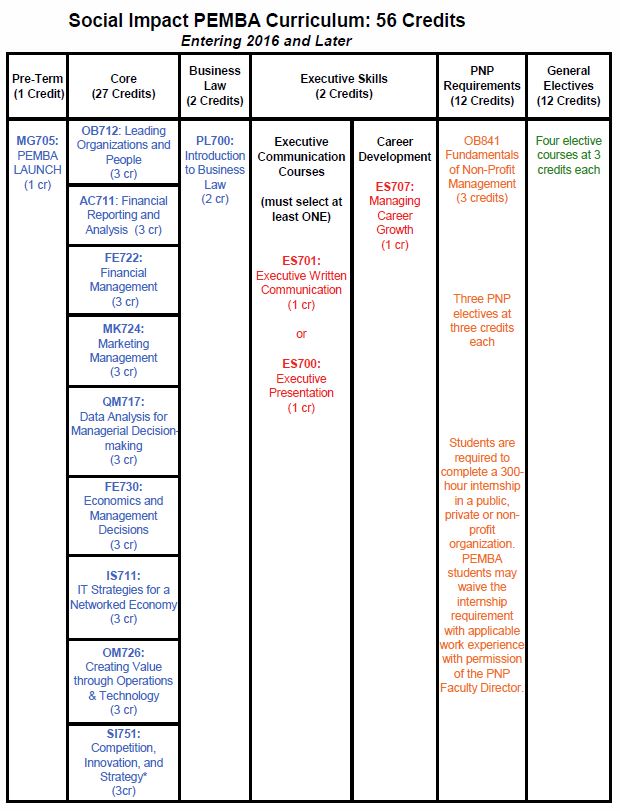
Social Impact PEMBA (Entering Fall 2015-Spring 2016)
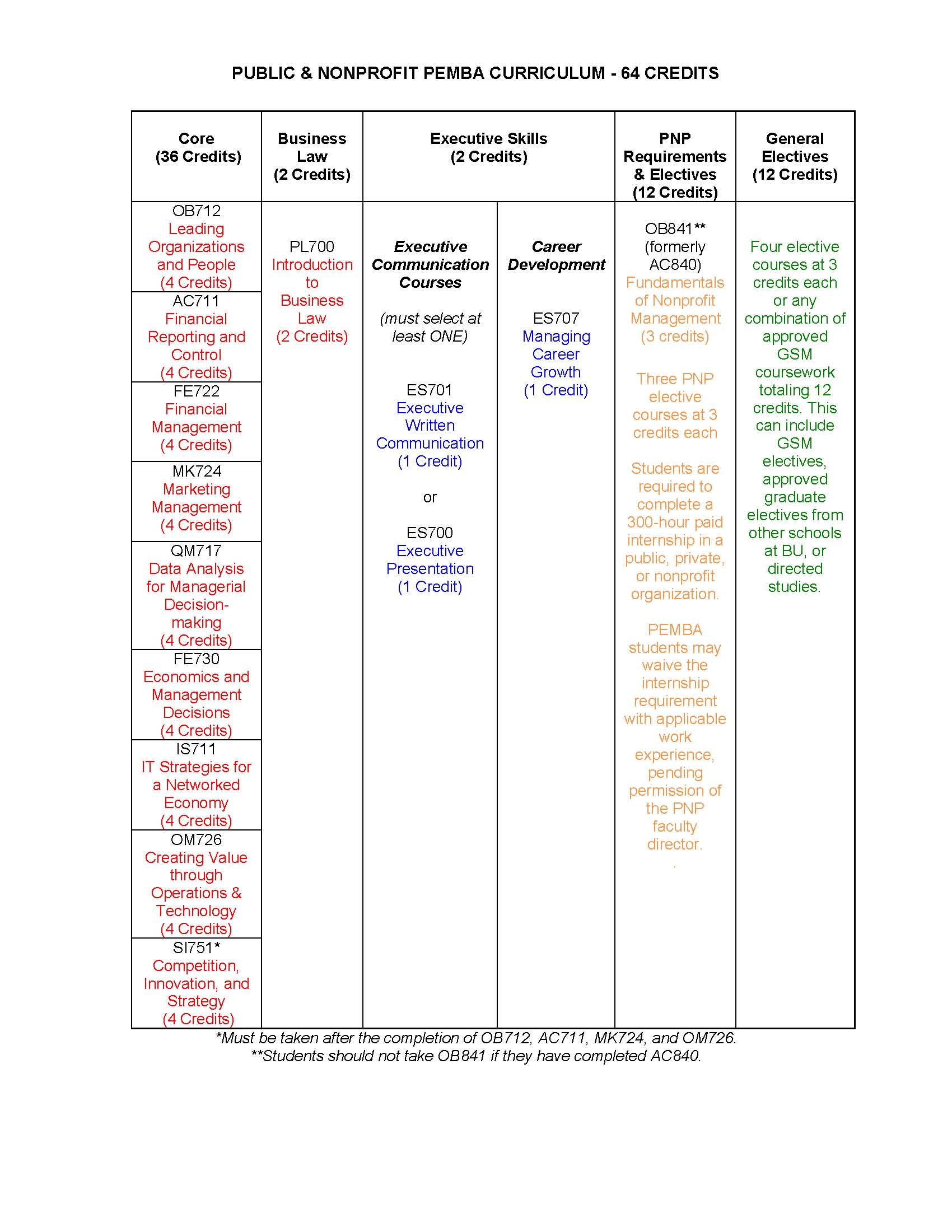
Required Courses (3 credits)
| Course: | Curric- ulum Info: | Pre-requisite: | Semesters: |
|---|---|---|---|
| SR801 Social Impact: Business, Society, and the Natural Environment - 3 cr. | Spring (Day & Evening) |
Elective Courses (9 credits)
To give students guidance on class selection, electives have been grouped into Career Pathways. Nine (9) credits of coursework selected from the following list are required:
| Course: | Curric- ulum Info: | Pre-requisite: | Semesters: |
|---|---|---|---|
| FE833 ESG Equity Investing - 3 cr. | Spring (Evening) | ||
| FE854 Entrepreneurial Finance - 3 cr. | QST AC710 or AC711, QST FE712 or FE722 | not offered in 2024-25 | |
| HM703 Health Sector Issues and Opportunities - 3 cr. | Fall (Evening) & Spring (Day) | ||
| IM860 Social Impact Field Seminar - 3 cr. | Fulfills Action Learning Requirement | Spring (Intensive) | |
| IS811 Responsible AI for Business Analytics - 1.5 cr. | Spring (Evening) | ||
| MK867 Purpose-Led Marketing - 3 cr. | QST MK723 or MK724 | Fall (Evening) | |
| MO830 Leading Mission Driven Organizations - 3 cr. | Spring (Evening) | ||
| MO833 Executive Compensation: Strategy and Practice - 3 cr. | Fall (Intensive) | ||
| MO848 Leadership Challenge - 3 cr. | QST MO712 or MO713 | Fall (Intensive) & Spring (Evening) | |
| OM832 Blockchain and Social Impact - 3 cr. | Fulfills Action Learning Requirement | QST OM725 or OM726, QST QM716 or QM717 | Spring (Online) & Summer 1 (Intensive) |
| OM851 Environmentally Sustainable Supply Chains - 3 cr. | not offered in 2024-25 | ||
| PL833 Business Law and Discrimination - 1.5 cr. | Spring (Evening) | ||
| PL855 Energy Sector Market Dynamics - 3 cr. | Spring (Evening) | ||
| SI836 Decarbonization of the Global Economy - 3 cr. | QST PL727 or QST PL730 | Fall (Evening) | |
| SI849 Corporate Sustainability Strategy - 3 cr. | QST SI750 or QST SI751 | Fall (Evening) | |
| SI852 Starting New Ventures - 3 cr. | QST FE712 or FE722, QST MK723 or 724, QST OM725 or OM726, QST QM716 or QM717 | Spring (Evening) | |
| SR831 Sustainability Reporting - 3 cr. | Spring (Evening) | ||
| SR841 Fundamentals of Nonprofit Management - 3 cr. | QST AC710 or QST AC711 | Fall (Evening) | |
| SR850 Global Entrepreneurship - 3 cr. | not offered in 2024-25 |
Note:
- *MK838, SI852, MO840 (OB840) only count towards a degree with a qualifying project.
- Some elective courses may not be offered every year.
- Students wishing to select a Questrom MBA elective not listed above, or wishing for a non-Questrom elective from another BU School or College to apply as a Social Impact elective, must get approval from the Co-Faculty Directors via the MBA Center’s Graduate Elective Request Form.
Social Impact Internship
Students are required to complete a 300-hour internship in a public, private, or nonprofit organization. Students selecting a private sector enterprise must focus their work on corporate social responsibility, sustainability, cause marketing, social enterprise, social impact, philanthropy or work for a socially responsible company. Students must confirm their internship with the MBA Center by completing the pre- and post-internship forms: Social Impact Internship Form (Part I) and Social Impact Internship Form (Part II).Part-time students may waive the internship requirement with applicable work experience, pending permission of the Social Impact Program faculty director. To apply for this waiver please complete the Internship Waiver Form. You will be asked to provide your resume, along with a brief description of your experience, your professional aspirations, and your reason for requesting an internship waiver. MBA+MSDT students are eligible to enroll in the Social Impact Program, and may complete the required internship following the MSDT summer intensive courses.
Resources
BU Social Impact & Nonprofit Management Club
Program Contact
Co-Faculty Directors of the Social Impact Program:
David Stolow (extra-curricular activities)
dstolow@bu.edu
617-353-2927
https://www.bu.edu/questrom/profile/david-stolow/
Rodrigo Canales, Faculty Director (Academic Lead)
MBA Center — Social Impact Program Liaison:
Francisco Tavares
tavares@bu.edu
617-358-4725
Management Science MBA
In the rapidly evolving business world, data, and analytics play an essential role. This major will teach you how to take a more quantitative approach to business decision-making. You’ll learn how to model future-facing business problems and conduct data analyses to inform decisions using spreadsheets, decision trees, optimization tools, and some basic programming. The Management Science major is designed to empower you to master a quantitative general management style and prepare you for a wide range of managerial careers, including consulting, technology, social impact, finance, operations, or entrepreneurship
The Management Science Major can be done on its own within the MBA, or can be combined with the Health Sector MBA, the Social Impact MBA OR the MBA + MS in Digital Technology. That said, it cannot be combined with more than one additional specialized program.
Curriculum Grids
The curriculum grids, as well as the program checksheets that your advisors use to check graduation requirements, are useful tools to help map out your degree requirements. Please refer to the curriculum grids below. Additionally, find your appropriate checksheet below to keep track of your progress:
MS PEMBA starting Fall 2021 and Later
Course Requirements:
Students must take the required course, one course (3 credits) from the Programming/Analytics list below, and three courses (9 credits) from the Electives list below. These electives can deepen your learning in the realm of Management Science. Please note, students may not substitute an additional course from the Programming/Analytics list for a course from the Electives list.
| Course: | Curric- ulum Info: | Pre-requisite: | Semesters: |
|---|---|---|---|
Required course: | |||
| IS879 Business Modeling with Spreadsheets - 3 cr. | Required | Fall (Day & Evening) & Spring (Evening) | |
Programming/Analytics (3 credits): | |||
| IS823 Analytics for Managers - 3 cr. | Programming/Analytics | Fall (Evening) & Spring (Day & Evening) | |
| IS833 Introduction to Data Analytics in Python - 3 cr. | Programming/Analytics | MSDT Students Only; IS717 or equivalent Python experience | Spring (Day) |
| IS834 Introduction to Python for Data Analytics - 3 cr. | Programming/Analytics | Fall (Evening) | |
| QM877 Intro to Python Bootcamp - 1.5 cr. | Programming/Analytics: QM877 AND QM878 | Spring (Saturday) | |
| QM878 Deep Learning with Python Bootcamp - 1.5 cr. | Programming/Analytics: QM877 AND QM878 | QM877, IS833, IS834 or instructor permission | Spring (Saturday) |
| QM880 Business Analytics: Spreadsheet Optimization and Simulation - 3 cr. | Programming/Analytics | QST QM716 or QST QM717 | not offered in 2024-25 |
Electives (9 credits) | |||
| AC820 Financial Analytics - 3 cr. | Elective | QST AC710 or AC711; AND FE711 or FE722; AND QST IS717 or IS833 or IS834 or QM877, or knowledge of Python (with instructor approval). | Spring (Day) |
| CAS CS595 Blockchains and their Applications - 4 cr. | Elective | ||
| FE823 Investments - 3 cr. | Elective | QST FE712 or FE722 | Fall (Day) & Summer 2 (Evening) |
| FE829 Futures, Options and Financial Risk Management - 3 cr. | Elective | QST FE712 or FE722 | not offered in 2024-25 |
| FE870 Analysis and Management of Financial Risk - 1.5 cr. | Elective | QST FE712 or FE722 | Fall (Saturday) |
| HM817 Advances in Digital Health - 3 cr. | Elective | Spring (Evening) | |
| IS737 Decision Making with Data - 3 cr. | Elective | QST IS717, IS833, IS834, QM877, or knowledge of Python | Spring (Evening) |
| IS811 Responsible AI for Business Analytics - 1.5 cr. | Elective | Spring (Evening) | |
| IS841 Advanced Analytics For Managers: Data Mining - 3 cr. | Elective | IS823 recommended | not offered in 2024-25 |
| IS843 Big Data Analytics for Business - 3 cr. | Elective | Python basics (e.g. IS717, IS834, QM877 or equivalent); Some prior experience with analytics (e.g. IS823, IS833, IS834, IS841, MK842, MK872, MK876); or permission of the instructor. | Fall (Evening) & Spring (Evening) |
| IS863 Integration of Generative AI in Business Practice - 1.5 cr. | Elective | Spring (Evening) | |
| MK842 Machine Learning for Business Analytics - 3 cr. | Elective | QST MK723 or MK724 | Spring (Intensive) |
| MK852 Data Driven Marketing Decisions - 3 cr. | Elective | QST MK723 or MK724, QST QM716 or QM717 | Fall (Evening) & Spring (Evening) |
| MK864 Pricing Strategy and Tactics - 3 cr. | Elective | QST MK723 or MK724, QST PL727 or PL730, QST QM716 or QM717 | Fall (Day & Evening) |
| MK876 Digital Marketing Analytics - 3 cr. | Elective | QST MK723 or MK724 | Fall (Evening) |
| MK878 Customer Analytics - 3 cr. | Elective | QST MK723 or MK724, QST QM716 or QM717, QST MK852 or IS833 | Spring (Evening) |
| MO860 People Analytics - 3 cr. | Elective | QST MO712 or MO713, QST QM716 or QM717 | Spring (Evening) |
| OM840 Improving Organizational Performance with Analytics - 3 cr. | Elective | QST OM725 or OM726, QST QM716 or QM717 | Fall (Evening), Spring (Evening) & Summer 1 (Evening) |
| OM851 Environmentally Sustainable Supply Chains - 3 cr. | Elective | not offered in 2024-25 | |
| OM854 Operations Analysis and Innovation - 3 cr. | Elective | QST OM725 or OM726 | not offered in 2024-25 |
| OM855 Project Management - 3 cr. | Elective | QST OM725 or OM726 | Spring (Evening) |
| PL855 Energy Sector Market Dynamics - 3 cr. | Elective | Spring (Evening) |
Program Contact
Eric Petersen
Management Science Liaison
MBA Center
epete@bu.edu
617.358.2788

Rafik B. Hariri Building
595 Commonwealth Avenue
Boston, MA 02215
MBA CENTER
For Residential MBA Students:
CONTACT
mbacenter@bu.edu
617.353.7800
OFFICE HOURS
Fall & Spring
Appts: M-Th 9am – 6:30pm, F 9am – 5pm
Summer
M-T 9am – 5pm, W-Th 9am – 6:30pm, F 9am – 1pm
HAR 416
@questrom_MBA
For OMBA students needing support, please contact ombasuccess@bu.edu
@questromgrad


